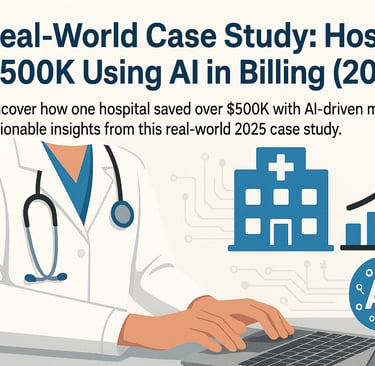Hospital Saves $500K With AI in Billing: 2025 Case Study
Discover how a hospital saved $500K using AI in billing. Explore this 2025 case study to learn real-world strategies and results.
4/30/20253 min read


Introduction
Imagine reducing your hospital's billing errors by 40% and saving over $500,000 annually. Sounds ambitious? In 2025, a mid-sized hospital achieved this feat by integrating AI-driven solutions into their billing processes. This case study delves into the strategies and technologies employed, offering insights for healthcare administrators aiming to enhance efficiency and financial performance.
Hospital Background and Initial Billing Challenges
The hospital, serving a diverse patient population, faced several billing challenges:Cedar
Manual Processes and Human Error: Reliance on manual data entry led to frequent coding errors, resulting in claim denials and delayed reimbursements.
Regulatory Complexity: Navigating the intricate web of healthcare regulations proved challenging, increasing the risk of non-compliance and associated penalties.
High Operational Costs: The billing department's inefficiencies contributed to escalating administrative costs, diverting resources from patient care.
Why the Hospital Chose AI-Powered Billing Solutions
In pursuit of operational excellence, the hospital evaluated several solutions and identified AI as a transformative tool for:
Enhancing Accuracy: AI's ability to analyze vast datasets promised a reduction in billing errors.
Streamlining Processes: Automation of routine tasks aimed to expedite claim submissions and approvals.
Ensuring Compliance: AI systems could stay updated with evolving regulations, mitigating compliance risks.
Implementation Process and Timeline
The hospital adopted a phased approach:
Pilot Testing: AI tools were initially deployed in select departments to assess efficacy.
Staff Training: Comprehensive training programs ensured seamless integration of AI into existing workflows.
Full-Scale Deployment: Following successful pilots, AI solutions were rolled out across all departments.
Technologies Used in the AI Billing Solution
The hospital integrated several AI technologies:
Natural Language Processing (NLP): Tools like 3M's 360 Encompass utilized NLP to automate clinical documentation and coding, leading to a 19% increase in net revenue.
Robotic Process Automation (RPA): RPA streamlined repetitive tasks such as data entry and claim submissions, enhancing efficiency.
Predictive Analytics: AI analyzed historical data to predict claim denials, allowing preemptive corrections and reducing rejection rates.
Key Results and Financial Outcomes
Post-implementation, the hospital reported:
$500K Annual Savings: Through reduced claim denials and operational efficiencies.
40% Reduction in Coding Errors: Enhancing the accuracy of claims and expediting reimbursements.
50% Decrease in AR Backlog: Improving cash flow and financial stability.
Lessons Learned and Best Practices
Key takeaways from the hospital's experience include:
Invest in Training: Empowering staff with the necessary skills ensures successful AI integration.
Start Small: Pilot programs help in assessing the suitability and effectiveness of AI tools.
Continuous Monitoring: Regular assessments and updates are crucial for sustained success.
Future Plans and Scalability
Buoyed by the success, the hospital plans to:
Expand AI Applications: Incorporate AI into other areas like patient scheduling and inventory management.
Enhance Predictive Capabilities: Develop advanced models for forecasting patient volumes and resource allocation.
Collaborate with Tech Partners: Engage with AI vendors to co-develop customized solutions tailored to the hospital's needs.
Conclusion
The integration of AI into hospital billing processes has proven to be a game-changer, delivering substantial financial benefits and operational efficiencies. As healthcare continues to evolve, embracing such technologies will be pivotal in enhancing patient care and organizational sustainability.
FAQ: AI in Hospital Billing
Q1: How does AI improve accuracy in medical billing?
AI enhances accuracy by automating data entry, validating codes against extensive databases, and flagging discrepancies in real-time, reducing human errors and claim denials.
Q2: What are the initial costs associated with implementing AI in billing?
Initial costs can vary based on the size of the institution and the complexity of existing systems. Expenses may include software licensing, hardware upgrades, staff training, and integration services.
Q3: How long does it take to see a return on investment (ROI) after implementing AI?
Many hospitals report seeing a positive ROI within 6 to 12 months post-implementation, primarily through reduced claim denials, faster reimbursements, and decreased administrative costs.
Q4: Is AI in billing compliant with healthcare regulations?
Yes, reputable AI solutions are designed to comply with healthcare regulations such as HIPAA. It's essential to work with vendors who prioritize data security and regulatory compliance.
Q5: Can AI be integrated with existing Electronic Health Record (EHR) systems?
Most modern AI billing solutions are designed to integrate seamlessly with existing EHR systems, facilitating smooth data exchange and streamlined workflows.
